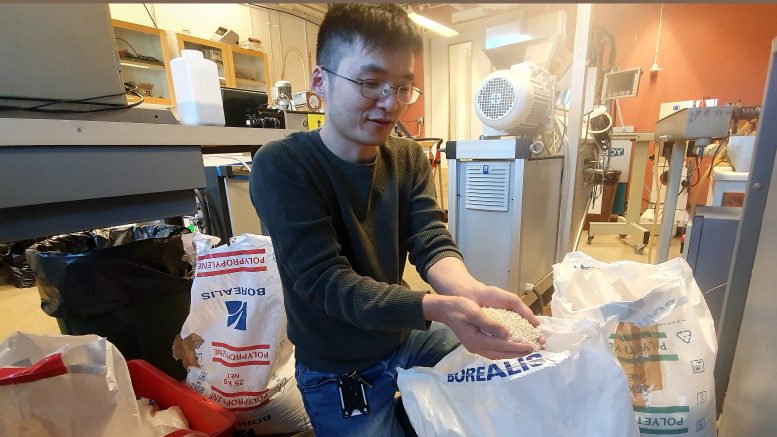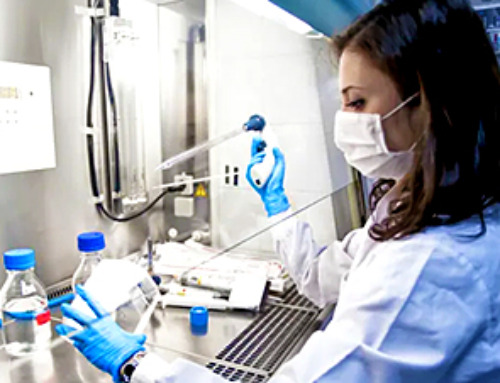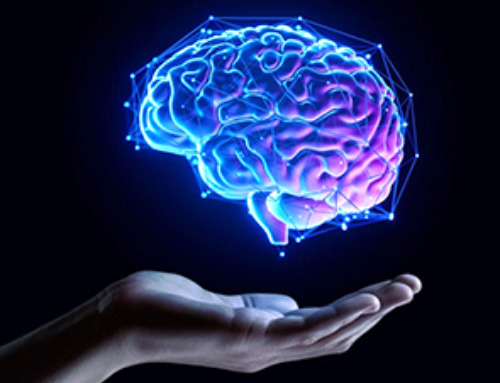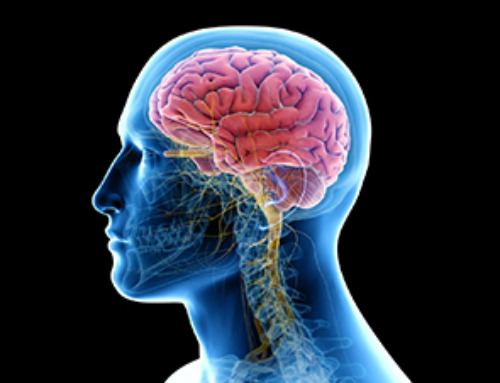Typically viewed as unrelated problems, global warming and plastic pollution are instead inextricably trapped in a "vicious circle" where one feeds the other, researchers in Sweden report in Nature Communications. The mutually-reinforcing relationship escalates global warming, the degradation of materials, plastic waste and the leaching of toxic chemicals into the biosphere.
Plastics that we rely on every day will deteriorate more rapidly because of rising global temperatures, and one effect will be a demand for more plastics. Xinfeng Wei, a researcher in polymeric materials at KTH Royal Institute of Technology in Stockholm, says meeting that demand will further compound greenhouse emissions that drive up the global temperature.
"A self-reinforcing cycle is formed, creating a vicious circle between climate change and plastic pollution," Wei says.
In 2019, plastics generated 3.4 percent of global greenhouse gas emissions, or about 1.8 billion tons, mostly on account of their production and conversion from fossil fuels, according to the Organisation for Economic Co-operation and Development (OECD). By 2060 that amount is expected to more than double.
Feedback Loop
The researchers describe a feedback loop linking these emissions with heat, moisture, and the weakening structural bonds that lend a wide range of advantageous properties to polymers, the term for materials—like plastic and rubber—which are formed from long chains of large molecules.
"The higher the increase in temperature, the more the materials' properties are compromised," Wei says. The stiffness of commonly used plastics like polyethylene, polypropylene, and polyvinyl chloride decreases by more than 20 percent as temperatures climb between 23 and 40°C, he says.
One effect of global warming is faster deterioration of plastics, which in turn results in higher carbon emissions, says Xinfeng Wei, seen here unpacking plastic pellets in the polymer materials lab at KTH Royal Institute of Technology in Stockholm. Credit: David Callahan
This deterioration means more frequent replacement of polymer products—everything from clothing to auto parts and appliances—and consequently greater manufacturing volumes and rates.
Knock-on effects range from rendering food packaging unreliable to the fouling of waterways and fish habitats by an increase in microplastics, he says.
Environmental Impact
The report also documents the release of volatile organic compounds (VOCs) in a warming climate as well as other hazardous compounds including lubricants, flame retardants, plasticizers, antioxidants, colorants, and UV/heat stabilizers. Heat will accelerate diffusion, evaporation, and leaching of these substances into the air, soil, and water, the report says.
The researchers draw attention to the combined effects of heat and moisture, which rise together due to global warming. "A warmer atmosphere increases the evaporation of moisture and can also hold more water vapor," Wei says.
That's bad news for many materials, but it wreaks particular havoc on plastics when combined with heat. "The combined effects of rising temperature and moisture create very challenging conditions for these polymers," Wei says.
To tackle the challenge of plastic pollution and climate change, Wei and the co-authors urged attention and mobilization of efforts across all sectors involved in the plastic lifecycle.
Reference: "Plastic pollution amplified by a warming climate" by Xin-Feng Wei, Wei Yang and Mikael S. Hedenqvist, 6 March 2024, Nature Communications.
DOI: 10.1038/s41467-024-46127-9
News
COVID-19 viral fragments shown to target and kill specific immune cells
COVID-19 viral fragments shown to target and kill specific immune cells in UCLA-led study Clues about extreme cases and omicron’s effects come from a cross-disciplinary international research team New research shows that after the [...]
Smaller Than a Grain of Salt: Engineers Create the World’s Tiniest Wireless Brain Implant
A salt-grain-sized neural implant can record and transmit brain activity wirelessly for extended periods. Researchers at Cornell University, working with collaborators, have created an extremely small neural implant that can sit on a grain of [...]
Scientists Develop a New Way To See Inside the Human Body Using 3D Color Imaging
A newly developed imaging method blends ultrasound and photoacoustics to capture both tissue structure and blood-vessel function in 3D. By blending two powerful imaging methods, researchers from Caltech and USC have developed a new way to [...]
Brain waves could help paralyzed patients move again
People with spinal cord injuries often lose the ability to move their arms or legs. In many cases, the nerves in the limbs remain healthy, and the brain continues to function normally. The loss of [...]
Scientists Discover a New “Cleanup Hub” Inside the Human Brain
A newly identified lymphatic drainage pathway along the middle meningeal artery reveals how the human brain clears waste. How does the brain clear away waste? This task is handled by the brain’s lymphatic drainage [...]
New Drug Slashes Dangerous Blood Fats by Nearly 40% in First Human Trial
Scientists have found a way to fine-tune a central fat-control pathway in the liver, reducing harmful blood triglycerides while preserving beneficial cholesterol functions. When we eat, the body turns surplus calories into molecules called [...]
A Simple Brain Scan May Help Restore Movement After Paralysis
A brain cap and smart algorithms may one day help paralyzed patients turn thought into movement—no surgery required. People with spinal cord injuries often experience partial or complete loss of movement in their arms [...]
Plant Discovery Could Transform How Medicines Are Made
Scientists have uncovered an unexpected way plants make powerful chemicals, revealing hidden biological connections that could transform how medicines are discovered and produced. Plants produce protective chemicals called alkaloids as part of their natural [...]
Scientists Develop IV Therapy That Repairs the Brain After Stroke
New nanomaterial passes the blood-brain barrier to reduce damaging inflammation after the most common form of stroke. When someone experiences a stroke, doctors must quickly restore blood flow to the brain to prevent death. [...]
Analyzing Darwin’s specimens without opening 200-year-old jars
Scientists have successfully analyzed Charles Darwin's original specimens from his HMS Beagle voyage (1831 to 1836) to the Galapagos Islands. Remarkably, the specimens have been analyzed without opening their 200-year-old preservation jars. Examining 46 [...]
Scientists discover natural ‘brake’ that could stop harmful inflammation
Researchers at University College London (UCL) have uncovered a key mechanism that helps the body switch off inflammation—a breakthrough that could lead to new treatments for chronic diseases affecting millions worldwide. Inflammation is the [...]
A Forgotten Molecule Could Revive Failing Antifungal Drugs and Save Millions of Lives
Scientists have uncovered a way to make existing antifungal drugs work again against deadly, drug-resistant fungi. Fungal infections claim millions of lives worldwide each year, and current medical treatments are failing to keep pace. [...]
Scientists Trap Thyme’s Healing Power in Tiny Capsules
A new micro-encapsulation breakthrough could turn thyme’s powerful health benefits into safer, smarter nanodoses. Thyme extract is often praised for its wide range of health benefits, giving it a reputation as a natural medicinal [...]
Scientists Develop Spray-On Powder That Instantly Seals Life-Threatening Wounds
KAIST scientists have created a fast-acting, stable powder hemostat that stops bleeding in one second and could significantly improve survival in combat and emergency medicine. Severe blood loss remains the primary cause of death from [...]
Oceans Are Struggling To Absorb Carbon As Microplastics Flood Their Waters
New research points to an unexpected way plastic pollution may be influencing Earth’s climate system. A recent study suggests that microscopic plastic pollution is reducing the ocean’s capacity to take in carbon dioxide, a [...]
Molecular Manufacturing: The Future of Nanomedicine – New book from Frank Boehm
This book explores the revolutionary potential of atomically precise manufacturing technologies to transform global healthcare, as well as practically every other sector across society. This forward-thinking volume examines how envisaged Factory@Home systems might enable the cost-effective [...]






















